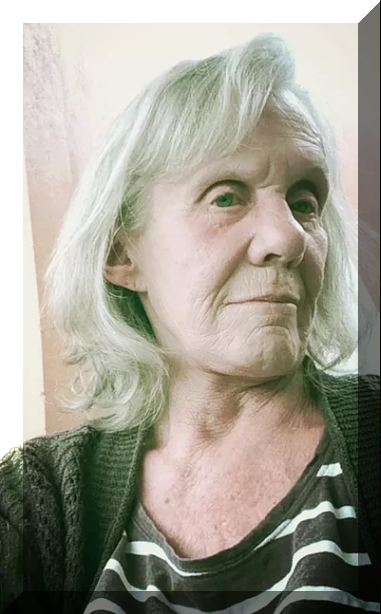On Suzuki Roshi by Mary Quagliata
Mary Quagliata cuke page for more on Mary, her art and life and links
|
I was a painting student at the San Francisco Art Institute when I first met him. Rob Gove invited him, (begged, probably) to come and speak. Rob and I had talked Zen over coffee so he knew of my interest. I'd begun reading about Zen in high school, where I'd found five books about Buddhism in the Stockton public library, including the Blyth Haiku translations which were very beautiful. Roshi was to speak at about 4:00 in the afternoon and I was looking forward to it. I hung around especially after I'd closed the cafeteria. I ran the school cafeteria in those days. But I didn't expect much. My heroes were Piero della Francesca and Pierre Bonnard, great painters who taught me and still do. I had no preconceptions about what a Zen teacher might be like. Or maybe I expected some macho guy; I'd worked with plenty of those on the school teaching staff. I wasn't shopping for a Zen teacher. After all, I was a painter and committed to it. So I enter the smoky cavern where the talk's to be. Well, we ALL smoke, so imagine what the air's like! It's a typical scene: paint smeared clothing and filthy hands, legs dangling over the backs of chairs, everyone yakking, joking. Maybe twenty or thirty people come to the talk. Rob leads in the shuffling Roshi and things quiet down a bit, but we still smoke. Suzuki isn't smiling, really, not trying to make any kind of impression at all, certainly making no judgments about his audience. And he begins his talk, a basic introduction to Buddhism: the Four Noble Truths and the Eight Fold Path, beginner stuff. You have to be very quiet to hear anything because he doesn't raise his voice above a whisper. Always in that small voice, so that you have to listen very hard and everyone does. Then I am practicing Zazen every morning. Which in my case entailed getting up at 5 in the morning to catch the 30 Stockton to downtown, where I transfer to the Sutter bus (waiting in the dark in front of Mervyn's), in order to arrive at Sokoji in time for zazen. Why? Who he was showed clearly; I saw it. I'd never met anyone who had so little affect, who appeared so normal, who, although obviously tired and possibly disinterested in his own talk, was completely willing to live within his role. He accepted his life and his role in it without struggle, and generously! Thoroughly! His Zen contained neither fetish[?] nor morality, was miles away from psychology. He gave us no hope and no hooks. He didn't care if we believed him. He offered nothing to believe in. He merely showed us some work to do. All of this was evident; one extrapolated it or just got it somehow. One could see it all, or sense it in his bearing, seeing and hearing him one time only. His unadorned presence liberated others, passed on the same freedom, or, one might get a glimpse. As I said, I wasn't looking for salvation and was taken quite by surprise. Here was a new kind of person. Intrigued, I became his student for the next six years, until his death. During those years I had many exchanges with him, but my original insight (about him) never changed, only deepened. I never felt I had to be close to him or get more of his attention than he cared to give, or that I needed more of it than the other students. It seemed to me that that first meeting contained the core for whatever was to follow in my life. That he had shown me myself, so to speak, so that I didn't need much more of him, personally. Since that first smoky half hour I was made aware of my completeness, an entity existing in profound emptiness, no, sharing it and exchanging it, being exchanged by it. Merely by observing him. And he had done nothing but stand there in the smoke and utter a few words. The endless fine tuning was to be up to me. He conveyed to us, with his presence, the core of his being and all emotion, yet he expressed almost no emotion, then. His talk was very dry, yet his presence connected with infinity. That's the only way to say it, really. In the following years I saw that over and over. And they were joyful years, and fun. |
 When I first met him, Suzuki Roshi had already gone beyond Buddhism. He
didn't need it any more, but was devoted to it, loved it the way one loves
one's own body. It was his skillful means, a vehicle, his raft. He lived
in the absolute, within his relative self, thus, to behold him was to
perceive a single but entirely integrated presence. A subtle thing,
however, no shouting, nor drama but a delicate soft persona, an old lady's
mind in a brown robe but concealing a clear, sharp power.
When I first met him, Suzuki Roshi had already gone beyond Buddhism. He
didn't need it any more, but was devoted to it, loved it the way one loves
one's own body. It was his skillful means, a vehicle, his raft. He lived
in the absolute, within his relative self, thus, to behold him was to
perceive a single but entirely integrated presence. A subtle thing,
however, no shouting, nor drama but a delicate soft persona, an old lady's
mind in a brown robe but concealing a clear, sharp power.